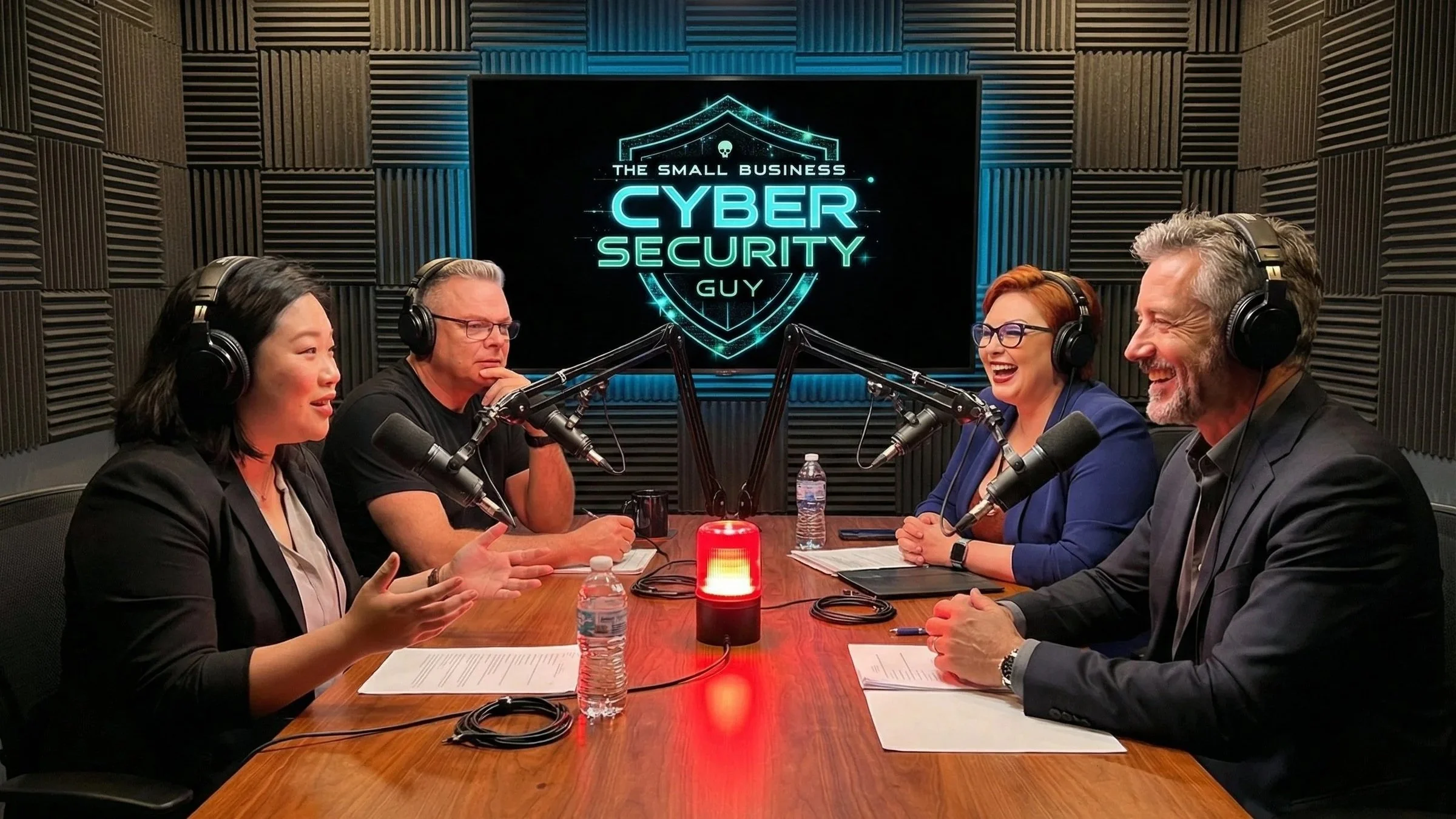⭐100K+ Monthly Downloads
⭐Top 20 Apple Management
⭐100K+ Monthly Downloads ⭐Top 20 Apple Management
The Small
Business
Cyber Security Guy
Welcome to the blog and podcast, where we share brutally honest views, sharp opinions, and lived experience from four decades in the technology trenches. Whether you're here to read or tune in, expect no corporate fluff and no pulled punches.
Everything here is personal. These are my and the team’s thoughts, opinions forged in the heat of battle! And not those of our employers, clients, or any other professional with whom we are associated.
If you’re offended, take it up with us, not them.
What you’ll get here (and on the podcast):
Straight-talking advice for small businesses that want to stay secure
Honest takes on cybersecurity trends, IT malpractice, and vendor nonsense
The occasional rant — and yes, the occasional expletive
War stories from the frontlines (names changed to protect the spectacularly guilty)
I've been doing this for over 40 years. I’ve seen genius, idiocy, and everything in between. Some of it makes headlines, and most of it should.
This blog and the podcast are where we break it all down.
Grab a coffee and pull up a chair, you need to see this!
Weekend Reflection - Efficiency Theatre and the Tyranny of the Measurable
Why do smart people keep making the same catastrophic mistake? Cut security spending, congratulate themselves on efficiency, watch everything fall apart, spend vastly more recovering. It's not ignorance. It's psychology. Measurable costs are visible, politically defensible, easy to justify cutting. Invisible value is theoretical until it disappears. CFOs get promoted for cutting £50,000 from budgets. Nobody gets promoted for preventing breaches that don't happen. This asymmetry creates systematic bias toward destroying things that actually matter. Weekend reflection on why efficiency theatre keeps winning despite catastrophic costs.
UK Case Study - The Manchester Marketing Agency That Cut Training and Lost Everything
Manchester marketing agency, 28 staff, £2.4M revenue. CFO proposed cutting security training: "£12,000 annually for slides nobody watches." Board agreed. Six months later, junior account manager clicked phishing link in fake client brief. No training meant she didn't recognise warning signs. Credentials stolen, ransomware deployed, three weeks offline. Recovery costs: £190,000. ICO investigation: inadequate training documented.
They saved £12,000 and spent £190,000 learning what training actually prevented. This is a real case, anonymized details, taught me never to treat training as optional expense. Names changed. Mistakes real. Costs actual.
Practical Guide - Evaluating Security Cost Cuts Without Destroying Your Business (Copy)
Stop cutting security costs based on gut feel and budget pressure. Start using actual frameworks that calculate downside risk. This practical guide walks you through evaluating any security spending decision: What's the notional function versus actual value? What's the cost of being wrong? What's the expected cost multiplied by probability? What invisible value disappears when you cut this? Includes checklists, decision trees, and real cost calculations for training, MFA, insurance, IT staff, and vendor relationships. Because the British Library's £7 million lesson shouldn't need to be learned individually by every UK business.
They saved £12,000 and spent £190,000 learning what training actually prevented. This is a real case, anonymized details, taught me never to treat training as optional expense. Names changed. Mistakes real. Costs actual.
The British Library's £7 Million MFA Decision
The British Library decided not to implement MFA on administrator accounts. Their reasoning: "practicality, cost and impact on ongoing programmes." That decision cost them £7 million in recovery, 600GB of staff data dumped on the dark web, and over a year of service disruption. This is Mauven's Take on one of the clearest examples of the doorman fallacy in UK history. When cost-cutting decisions focus narrowly on immediate expense whilst ignoring catastrophic downside risk, you get exactly this result. And before you say "but we're not a major institution," remember: the attack vector works identically on your systems.
The Doorman Fallacy - Complete Framework for UK Businesses
I've watched businesses make the same catastrophic mistake for 40 years. They look at security costs through a narrow efficiency lens, define roles by their obvious function, cut them to save money, and completely miss the invisible value. Until it's gone. Then they spend 10 times more fixing what they broke. The doorman fallacy explains every stupid IT decision I've ever seen: training cuts that cost millions in breaches, MFA removal that gifts credentials to attackers, insurance cancellation that leaves businesses exposed, IT staff replacement that destroys institutional knowledge. Stop optimising for obvious functions. Start understanding actual value.
⚠️ Full Disclaimer
This is my personal blog. The views, opinions, and content shared here are mine and mine alone. They do not reflect or represent the views, beliefs, or policies of:
My employer
Any current or past clients, suppliers, or partners
Any other organisation I’m affiliated with in any capacity
Nothing here should be taken as formal advice — legal, technical, financial, or otherwise. If you’re making decisions for your business, always seek professional advice tailored to your situation.
Where I mention products, services, or companies, that’s based purely on my own experience and opinions — I’m not being paid to promote anything. If that ever changes, I’ll make it clear.
In short: This is my personal space to share my personal views. No one else is responsible for what’s written here — so if you have a problem with something, take it up with me, not my employer.









